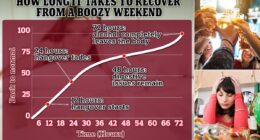Skipping dinner is an easy habit to slide into, and there are many ways to get into the routine of doing so. For example, you may have heard of the antiquated punishment of having no dinner and going straight to bed from when you were a child. Or, flash forward to now, maybe you just are too full from a big lunch, or perhaps just too busy to eat dinner.
Although it seems like a minor setback with no actual repercussions, it turns out that skipping dinner is more harmful to your body than you might have thought. According to medical board expert Lisa Moskovitz, RD, CEO of NY Nutrition Group and author of The Core 3 Healthy Eating Plan, skipping dinner can affect your sleep and overall health.
“Whether it’s intentional or not, regularly skipping dinner may backfire and lead to poor sleep quality which can cause a myriad of health issues over time,” says Moskovitz.
Moskovitz suggests that without taking the time to eat a balanced dinner, your body may miss out on essential nutrients and enter a state of calorie deprivation– the damaging lack of calories your body needs.
“A mild calorie deficit is one thing, but if it’s too extreme, hunger can wake you up throughout the night or make it harder to feel relaxed enough to enter deep sleep,” says Moskovitz. “Furthermore, adequate nutrition is necessary to produce our sleep-regulating hormones serotonin and melatonin.”
READ RELATED: Will coming off statins put my heart at risk? DR MARTIN SCURR answers your health questions
According to the Nutrients Journal, a lack of nutrients causes insufficient sleep as well as sleeping disorders. Specifically, a lack of vitamin D is associated with a higher risk of sleep disorders.


Moskovitz also says that mood, energy, immunity, and metabolism will be impacted by lack of rest due to under-eating and/or eating inconsistently.
According to the Sleep Foundation, sleep is a necessity and an essential function that allows your body and mind to recharge, which leaves you refreshed and alert when you wake up. Proper sleep also helps the body remain healthy and stave off diseases. The brain cannot function properly without an adequate amount of sleep. This impairs your abilities to concentrate, think clearly, and remember things.
A study published in the Neuropsychiatric Disease and Treatment Journal also indicated that acute total sleep deprivation– no sleep or a reduction in the usual total sleep time– affects attention and working memory. Chronic partial sleep deprivation– chronic patterns of insufficient sleep– does the same. Total sleep deprivation also impairs many cognitive functions.
Kayla Garritano
Source:











